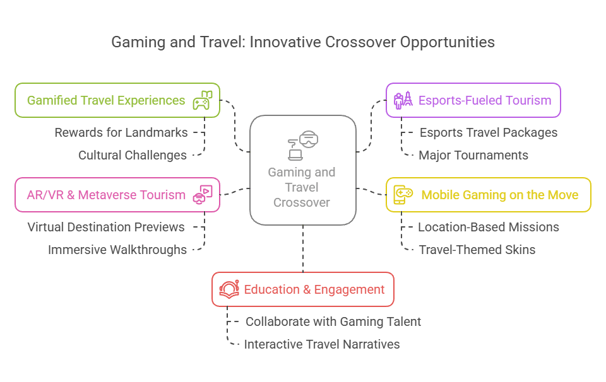



Our Gaming Vision
The global gaming industry is on a powerful growth trajectory, projected to rise from USD 244.22 billion in 2024 to USD 397.21 billion by 2029—a robust CAGR of 10.79%. Driven by mobile gaming, esports, AR/VR, and the rise of the metaverse, gaming is reshaping digital engagement across industries, including tourism and travel tech.
How Gaming Powers Travel & Tourism Tech
• Gamified Travel Experiences
The evolution from arcade classics like Pac-Man to cloud gaming and cross-platform play opens doors for gamified destination discovery. Travel companies can integrate game mechanics into apps, letting users earn rewards for visiting landmarks, completing cultural challenges, or exploring cities in AR.
• Esports-Fueled Tourism
Esports’ explosive growth—complete with million-dollar tournaments and sold-out arenas—creates new demand for event-based travel. Tour operators can offer esports travel packages with VIP access, local experiences, and exclusive meet-and-greets. Cities can attract global footfall by hosting major tournaments and gaming expos.
• Mobile Gaming on the Move
With Asia Pacific—especially South Korea, China, and Japan—leading global gaming revenue, mobile gaming is a natural fit for travelers. Tourism apps can partner with mobile game developers to feature location-based missions, travel-themed skins, or promotional rewards tied to physical destinations.
• AR/VR & Metaverse Tourism
Though investment in AR/VR remains limited, the opportunity is huge. Travel tech firms can create virtual destination previews, historical site re-creations, or fully immersive hotel and resort walkthroughs within the metaverse. These digital touchpoints enhance pre-trip planning and post-trip sharing.
• Education & Engagement
With game design degrees and programs like M-Labs training over 10,000 creators, a new generation of digital storytellers is emerging. Destinations can collaborate with gaming talent to design interactive travel narratives, turning cultural heritage and local lore into playable experiences.
Challenges & Opportunities in the Gaming–Travel Crossover
Challenges:
High Development Costs: Creating high-quality VR/console games requires significant investment—travel brands may need to partner with gaming studios to co-develop content.
AR/VR Adoption: Despite potential, hardware accessibility and content maturity remain barriers for widespread AR/VR tourism applications.
Opportunities:
Cross-Border Partnerships: International co-productions and brand collaborations can fuel global travel campaigns built around popular gaming IPs.
Freelance Creative Talent: Tap into the vibrant global developer ecosystem for agile, cost-effective game-based travel experiences.
Metaverse Integration: Establish virtual tourism hubs, host interactive destination previews, or run metaverse-based events tied to real-world attractions.
The Road Ahead
The gaming industry has outpaced music and film combined in global revenue—and its synergy with travel tech is just beginning. With innovation, strategic partnerships, and creative development, the gaming–tourism connection can create interactive journeys, immersive storytelling, and unforgettable experiences that attract next-gen travelers.
Get in touch



Gaming Transformed Travel
Explore the future of travel with gamified experiences, esports tourism, and immersive cultural storytelling.
Get in touch
83 Watsonbrook Dr. Brampton, L6R 0R5, ON, Canada
contact@aidoctrine.com
Shahed Tower, 10 Floor, Mirgab, Kuwait city, Kuwait
